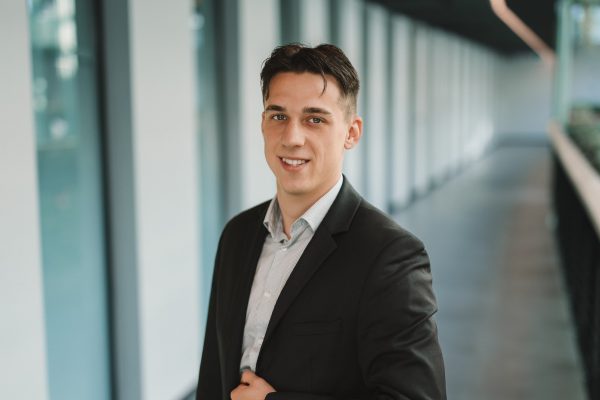
Gytis Oškelis
IIRPS VU student
You are already a fourth-year student at IIRPS VU, how did your journey at the Institute start? What was most memorable from these 4 years?
It was definitely not easy to choose to study at IIRPS. In the 12th grade, the choices for studies varied from the Lithuanian Military Academy to statistics. Finally, I decided to take a gap year to do my 9-month initial military service and to think about where exactly I wanted to turn my future. But in fact, even before I started my service, my heart was already set on IIRPS for its broad and interesting political science programme. This attitude has not changed after my service.
There are probably two moments in my studies that stand out the most. The first one was the first month of studies, when everything is very new, very interesting and you think that everything is still ahead of you. The second was in the first semester of the 3rd year, when I studied subjects of my own choice in the interesting Global Politics module, EC and GUS, and combined it with work. Although this period was the hardest in terms of workload, most of your time is spent being productive, studying what you like and meeting up with good friends and colleagues to talk before and after lectures… it’s really heartwarming to experience such things.
You’ve just finished your bachelor’s thesis, how did the writing process go? What was your topic? Why did you choose this topic?
The writing process was hectic, but in the end I would say it was quite enjoyable. I enjoyed working with the supervisor to solve the problematic questions about the possible limitations of the research, which encourages you to look at the problem from different angles.
My topic was about why NATO countries have different levels of support for Ukraine. I chose this topic to balance my interests with my strengths. Back in the first half of 2022, when the Russian invasion of Ukraine began, you could say that I was a supporter of countries giving as much military support as possible to Ukraine in order for it to defend itself and take back the territories that have been seized. As the war continued, the importance of military support for Ukraine became apparent (think of the HIMARS strikes in July-August 2022), and the question of why some countries with the resources to do so did not provide more arms to Ukraine in order for it to win the war began to emerge. I have tried to answer this question by applying the qualitative comparative analysis of fuzzy sets. I chose it because I have used it before and I thought that a study of international politics using a slightly more sophisticated statistical method could result in an interesting and original work.
You are the founder and leader of the Vilnius University Student Civil Resistance Committee, can you tell us more about the establishment of the new student initiative and the activities of this committee?
This initiative started unexpectedly. During a hackathon organised by the VU Students’ Representation, together with Simas from the Faculty of Physics, we presented the idea that VU needs an initiative related to civil resistance and collective defence. And this initiative would be aimed at Vilnius students because there is no other entity that could fill this niche. In less than two months, I think we have done a lot, especially considering that all 5 of our members were also fighting the challenges of their bachelor’s degree together. For example, we have almost 400 followers on Facebook, we organised a hike, and a discussion on student resistance topics, so I would consider it a success so far. It is really clear that there are a lot of people who are interested in these topics, so in the future we will try to expand our activities, cooperation with other institutions and organise even more different activities. To find out which ones, I kindly encourage you to follow us on social media.
Do you already have plans for what you will do after your Bachelor’s degree? What areas are you most interested in?
I will try to continue to be actively involved in community/societal activities by further developing the activities of the committee mentioned above and by coordinating the marketing area in the VU Student Representation. I definitely plan to continue my studies at IIRPS. I would be most interested in the field of International Relations, but I should take more time to think about what I would like to do in my future.
What would you like to wish the IIRPS VU community?
I would just like to wish you to keep being as open, flexible, and proactive as possible. For me, IIRPS is a place where both the lecturers and the administration are very open to any kind of suggestions, and initiatives. We have four active student organisations, where I think everyone can find a place. There is definitely a sense that the community is ‘alive’ and that is what a community is, because the administration, the lecturers and the students are not somehow isolated from each other.







